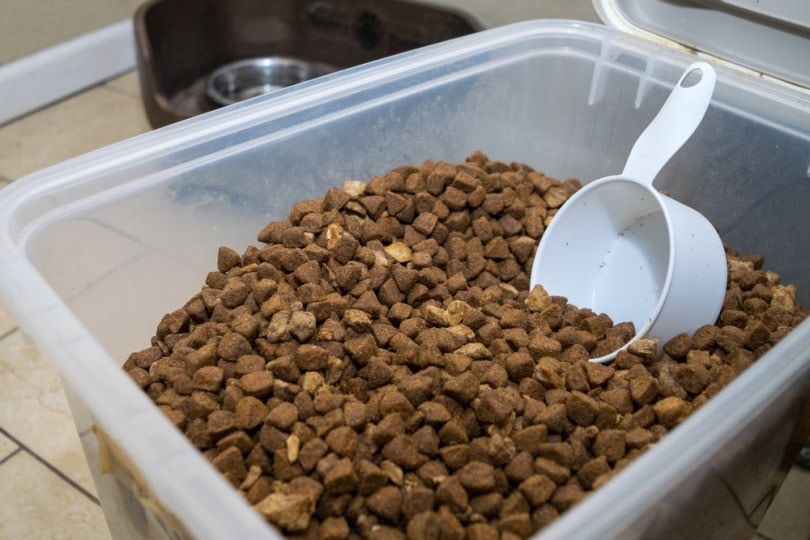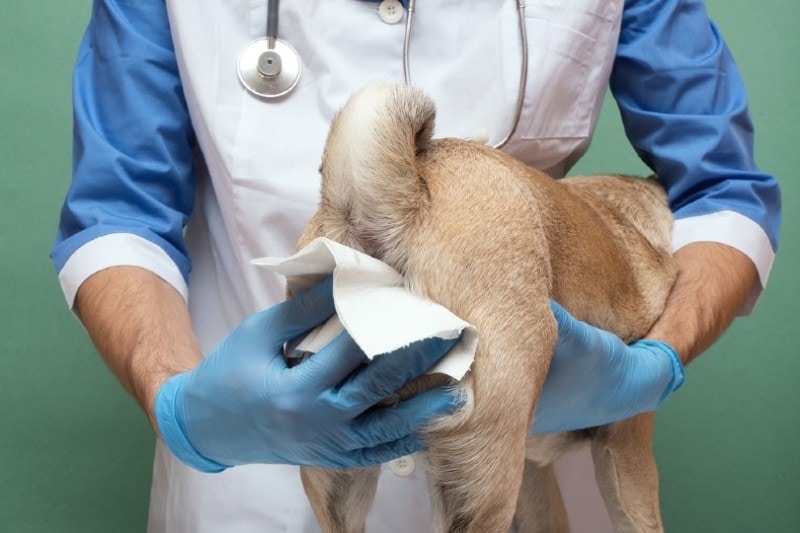Menadione in Dog Food: Vet-Reviewed Safety Facts
Updated on

Menadione is a synthetic form of vitamin K that’s often added to dog food as a nutrient source. While it helps ensure a balanced diet for our canine companions, there has been a bit of controversy surrounding its safety. Concerns have arisen due to its synthetic nature and the potential side effects associated with high doses. In this article, we explore the safety considerations of menadione in your best furry friend’s food.
What Is Menadione?
Menadione is simply vitamin K3. Vitamin K plays an essential role in blood clotting and the maintenance of bone tissue. There are three forms, all of which belong to the quinone family:
- Vitamin K1 (phylloquinone) is only synthesized by plants. As a result, it is mainly found in foods of plant origin (cabbage, leafy green vegetables, etc.).
- Vitamin K2 (menaquinone) is synthesized by bacteria in the guts of mammals. It is found in foods of animal origin.
- Vitamin K3 (menadione) is a synthetic form that can be converted into vitamin K2 by the liver. It is used in two forms: Menadione sodium bisulfite complex (MSBC) and Menadione nicotinamide bisulfite (MNB).
Today, it is no longer sold as a dietary supplement for humans due to potential side effects. However, menadione is still commonly found in poultry and pig feed and commercial dog and cat foods.

What Is the Use of Menadione in Dog Food?
Since menadione plays an important role in blood clotting and bone health, it is commonly added to livestock feeds and pet foods to ensure adequate nutrient levels and prevent animals from developing vitamin K deficiencies. It is therefore vital that vitamin K in some form is present in your dog’s food.
Why Is There Controversy Surrounding the Use of Menadione in Dog Food?
Controversy has arisen due to the concern by some people of the potential risks associated with menadione supplementation. High doses of menadione given into the bloodstream (IV) have been linked to various health issues in laboratory animals, such as liver toxicity and damage to red blood cells. These findings led some people to question whether its use in pet food is safe for long-term consumption, especially since dogs may be exposed to it consistently throughout their lives if it’s a regular component of their diet. The doses given in these studies were magnitudes higher than is present in pet food and often was given intravenously or force fed.
However, despite the effects of menadione in humans, this vitamin has not been shown to produce adverse effects when added to the diet of pets and livestock at regulated doses. Still, some people think that K3 should not be allowed in pet foods, and a few companies are taking advantage of this by touting the “superiority” of their pet food because it doesn’t contain added menadione.
That said, the Food and Drug Administration (FDA) mentions, “Synthetic vitamin K usually used in animal feed can be added at levels as high as 1,000 times the dietary requirement without seeing adverse effects in animals, except in horses.”

Potential Side Effects of Menadione
It’s essential to note that most commercial pet foods use vitamin K3 within regulatory guidelines established by food safety authorities. While side effects of menadione have been observed in laboratory animals when given at extremely high doses, at the prescribed levels, menadione is not thought to pose risks for your dog. Still, if you have concerns about this substance or if your dog has specific health conditions, it’s always best to consult with a veterinarian.
Here are the side effects that have been reported in studies:
- Liver damage. Very high doses of menadione have been linked to liver toxicity in laboratory animals.
- Hemolytic anemia. Menadione can cause damage to red blood cells, leading to a condition known as hemolytic anemia. This condition can be severe and cause signs like weakness, jaundice, fever, dark-colored urine, and lethargy.
- Allergic reactions. Some dogs may develop allergic reactions to menadione or other ingredients in pet food containing this synthetic vitamin K source. Allergic reactions can manifest as itching, hives, or gastrointestinal issues. Reactions are more common if it is given by injection.
- Long-term health effects. Concerns have been raised about the potential long-term effects of regular exposure to menadione, especially since its use in pet food could lead to consistent consumption over a dog’s lifetime. But there is not enough information to support these concerns.
What Is the Regulatory Status of Menadione in Pet Food?
Critics argue that long-term effects may not be well-studied, and individual dogs may have varying sensitivities to this synthetic vitamin K source. However, various regulatory agencies, including the U.S. FDA and the European Food Safety Authority (EFSA), have set guidelines for the use of menadione in pet foods. The permissible levels are generally considered safe for most dogs.

Frequently Asked Questions (FAQ)
Are There Any Alternatives to Menadione in Dog Food?
Many pet food manufacturers are moving toward using more natural sources of vitamin K, such as vitamin K1 (phylloquinone) found in green leafy vegetables. Vitamin K1 is generally considered safe and does not have the same controversial history as menadione.
How Should I Choose the Best Dog Food for My Pet’s Health?
Choosing the best dog food involves considering your pet’s specific health needs, age, breed, and any existing medical conditions. Look for pet foods labeled as “complete and balanced,” and consult with your vet for personalized recommendations.
Are There Ongoing Studies on the Safety of Menadione in Pet Food?
Scientific research is continuously evolving, and there are ongoing studies regarding the safety of menadione in pet food. The best way to stay informed is by referring to reputable sources and consulting with your veterinary team for the latest updates and recommendations.
How Can I Ensure My Dog’s Overall Well-Being Beyond Diet?
Beyond diet, providing your dog with regular exercise, proper grooming, routine veterinary check-ups, and plenty of love and attention is essential for their overall well-being and happiness.

Conclusion
According to the scientific data available to date, you don’t have to worry if your beloved pup’s food contains menadione. The FDA, EFSA, and AAFCO have all given the go-ahead for its use in pet food. It is important to remember that vitamin K deficiency also causes health problems such as poor blood clotting and so it needs to be present in your dog’s diet. If you are still skeptical, you can always try dog foods that do not contain vitamin K3, but be aware that you may end up paying more to avoid the as yet, unfounded risk.
Featured Image Credit by: APN Photography, Shutterstock












